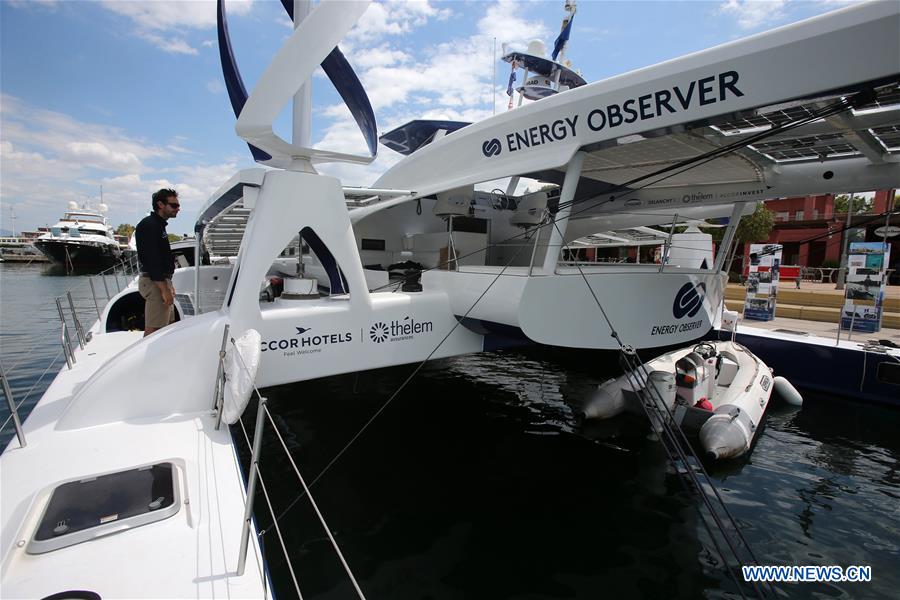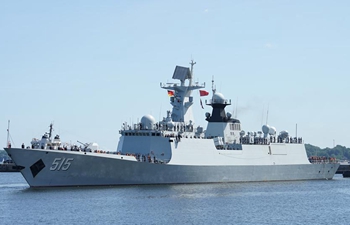
The vessel "Energy Observer" is docked at Flisvos Marina in Athens, Greece, on June 21, 2018. The first vessel powered by renewables and hydrogen, "Energy Observer", has moored at Flisvos Marina in Athens this week in the 20th stopover of its world tour to raise awareness on energy transition and meet pioneers who work for a cleaner planet. (Xinhua/Marios Lolos)
by Alexia Vlachou
ATHENS, June 22 (Xinhua) -- The first vessel powered by renewables and hydrogen, "Energy Observer", has moored at Flisvos Marina in Athens this week in the 20th stopover of its world tour to raise awareness on energy transition and meet pioneers who work for a cleaner planet.
Since it left Saint-Malo in France last June, Energy Observer has traveled more than 7,000 nautical miles, without emitting any greenhouse gases or fine particles.
Led by Victorien Erussard, captain and founder of the Energy Observer and Jerome Delafosse, documentary director and expedition leader, the vessel is conducting a long odyssey that will span six years, visit 50 countries and make 101 stopovers.
WORLD TOUR
"It started in 2017 and will finish in 2022. We are on the second year. The first year has been the tour of France starting from Saint Malo and ending up in Marseilles. We started the Mediterranean tour and we will end up in Saint Malo in October 2018. In 2019 we will be in northern of Europe and then in 2020 we will be in rest of the world and will be also in China," External and Institutional Relations Director Cathy Noguez told Xinhua.
During this time, the goal is to mobilize the public on key aspects of the environmental transition, like renewable energy, biodiversity, mobility, and the circular economy.
"We want to create a community, discover people of what they are doing, important projects or small projects which have a great impact for the planet. It is an odyssey around the earth to meet the people of what they are doing now not only for the long future for the planet," Noguez told Xinhua.
After Tunisia, Israel and Cyprus, the vessel traveled through the Greek islands, from Crete to Dodecanese to the Cyclades Islands, to reach the Greek capital and fascinate locals and authorities.
After an outstanding racing career, the vessel has gained a new life, to sail autonomously powered by hydrogen.
Equipped with a revolutionary energy architecture, the futuristic floating tech laboratory consists of 130 square meters of photovoltaic panels combining three different technologies (conformable, bifacial and with a non-slip coating), and two vertical axis wind turbines for power production.
"The particularity of this ship is that this is the first hydrogen vessel around the world. It uses hydrogen to store more energy on boat. So, there are two modes of functioning. The first is when we are on the pier the goal is to refill our energy storage. So, the first energy storage is the batteries. Firstly, we charge them and when they are charged instead of losing this energy we electrolyze the salted water from renewable energies to create hydrogen and to storage into the big tanks on the side of the boat," engineer Hugo Devedeux explained.
VESSEL'S AIM
This expedition will test, in extreme conditions, an innovative energy architecture based on a smart system of energy production, management, and storage.
Thanks to its diversity of renewable energies (solar, wind turbine, and hydroelectric) and double storage composed of batteries and hydrogen that is produced on board through electrolysis of seawater, the vessel aims for energy autonomy.
"We want to mix all these energies, there is not one that overrides the other. We really need all these kinds of energy to reach our goal," second captain Jean -Baptiste Sanchez told Xinhua.
"Our will and message are to show that by mixing all these energies in a smart way, always with the best performance for each energy, we can be completely autonomous," he added.
During navigation, the goal is to balance the power consumption for propulsion and life on-board by directly using renewable energies.
"When we are moving and sailing the electric motors take a lot of energy. In the day, this energy is produced by the solar panels, so we only use the solar energy in the day and at night we use the hydrogen to create electricity, heat and water," Devedeux added.
The outer goal of this scientific challenge is to optimize these technologies in extreme conditions, in order to prove their viability on land. For the team, hydrogen can be the green fuel solution for the future.
"In the next few years with the big improvement in renewable energies there are going to be a lot of them on the network and the only particularity of the renewable energy is that it is intermittent. So, you have to store energy somewhere to reuse it later because the consumer is always using electricity. I think hydrogen can play a role in network, buildings, transportation, it's a very large area," Devedeux noted.
But for this to happen Noguez stressed that technology cannot stand by itself.
"It has to be accompanied by a regulatory framework. So, this is where politicians can help and contribute," she said.
The Energy Observer is supported by the International Renewable Energy Agency (IRENA), the EU Commission, UNESCO and the French Ministry for the ecological and solidary transition.















